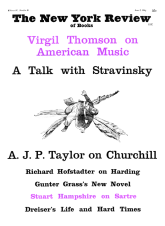In response to:
Utopia or Bust from the May 6, 1965 issue
To the Editors:
I am grateful for Robert Heilbroner’s very sympathetic review of People or Personnel. May I say just a word about his complaint that I do not point out that the organizational changes I advocate are revolutionary and not “within the evolutionary limits of our own society”?
I think they are revolutionary. But, as I argue throughout People or Personnel, I do not think they are so revolutionary as the “evolutionary” changes which have been wrought in less than two generations of unbridled centralism, in deforming the landscape, regimenting the culture, trivializing democracy, and altering “human nature.” I would certainly prefer the risk of revolutionary troubles with a livable end in view than the horror of drifting calmly into 1984 with an inevitable explosion of anomie and worse.
I am writing this letter from Stockholm after spending a month in Denmark. From this part of the world many of my far-out proposals do not seem “revolutionary” at all. It is not “the legal network of contractual obligations of a capitalist system,” as Mr. Heilbroner puts it, that has caused our difficulties in the United States; rather, it is the way this system has organized itself without human obligations and without countervailing cooperative and public pressures. For example, it is probably not illegal to impose a tax on the audience-size of mass media in order to create a fund to help independent and dissenting media to get started. It is certainly not illegal to regulate drug-pricing and automobile policy, as asked for in Estes Kefauver’s In a Few Hands.
The constitutional principle that I keep urging in People or Personnel is to build in countervailing tendencies in proportion as any centralizing tendency, public or private, becomes dangerously destructive. My feeling is that this principle is conservative rather than revolutionary. I do not think it is at all utopian. But given a system mechanically expanding “for its own sake,” it is revolutionary.
Paul Goodman
Stockholm
Robert L Heilbroner replies:
There are two meanings to the word revolutionary. One is metaphorical, expressive of a striking contrast between an initial and a terminal state of things. The other is political. It refers to an overthrow, violent or not, of an existing structure of power.
Mr. Goodman’s use of the word is metaphorical. He is entirely correct that great changes have occurred in the past fifty years, quite without political convulsions, and that still greater ones portend, very likely without any political struggle at all.
My point is that the existing trend of things reflects a given social order, and that to redirect that order, to change its inherent tendencies, would require a change of another kind—a transfer of power of such decisive character that I would describe it as “revolutionary” in the political sense.
Like Mr. Goodman, I am all for trying every countervailing power we can against the prevailing drift into a mechanical society. I can only reiterate my doubt that it will be possible to accomplish the task of thorough-going social renewal Mr. Goodman has in mind without running the gamut of a revolution of the old-fashioned kind.
This Issue
June 3, 1965



